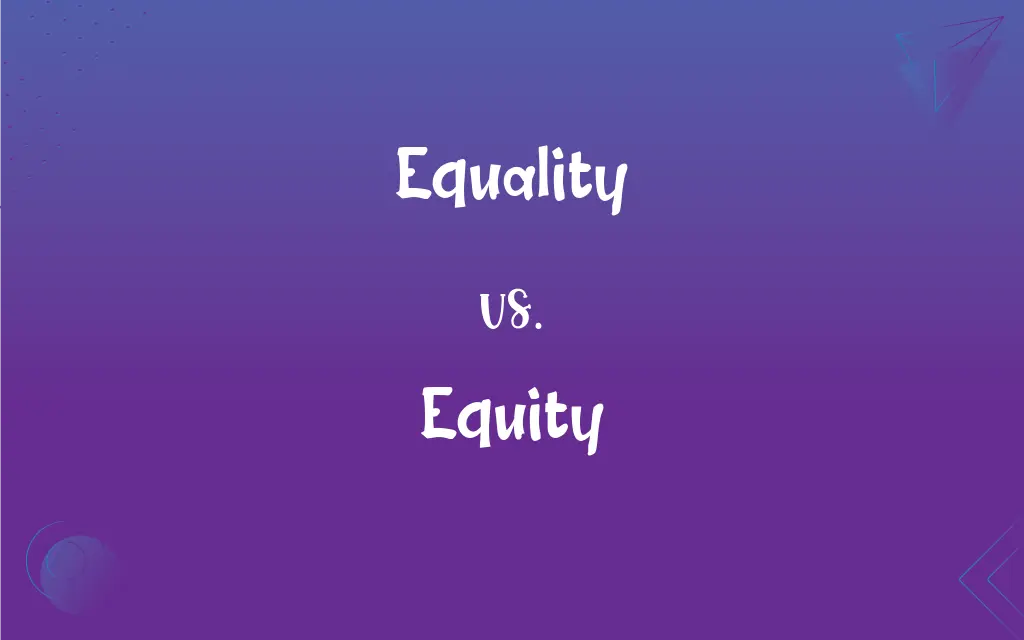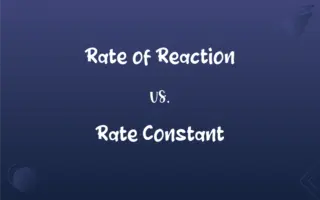Equality vs. Equity: What's the Difference?
Edited by Janet White || By Harlon Moss || Updated on October 23, 2023
Equality is treating everyone the same; equity is ensuring everyone has what they need to be successful.

Key Differences
Equality refers to providing the same resources, opportunities, or treatment to all individuals, irrespective of their individual needs or differences. On the contrary, equity is about recognizing that different individuals might have different needs and providing resources or adjustments accordingly.
While equality aims to ensure that everyone gets the same, equity strives to ensure that everyone gets what they need. This distinction is significant because treating everyone the same doesn't necessarily lead to fair outcomes.
Think of equality as giving everyone the same-sized shoes, while equity is ensuring everyone has shoes that fit. Even if everyone gets shoes (equality), they might not fit or be suitable for everyone's needs (equity).
An equality-focused approach might overlook the diverse needs of individuals in a community. In contrast, an equity-centered approach tailors resources and support to ensure all individuals can achieve similar outcomes.
Promoting equality can be an essential first step towards fairness, but achieving true fairness often requires an emphasis on equity, which acknowledges and addresses inherent differences and barriers.
ADVERTISEMENT
Comparison Chart
Basic Definition
Treating everyone the same
Ensuring everyone has what they need
Focus
Uniformity
Fairness
Approach
Same resources for all
Tailored resources based on needs
Outcome
Same starting point
Similar opportunity for success
Consideration
Doesn't consider individual differences
Recognizes and addresses differences
ADVERTISEMENT
Equality and Equity Definitions
Equality
Correspondence in amount, value, or character.
She fought for the equality of rights between men and women.
Equity
The quality of being fair or impartial.
The judge ruled with a sense of equity.
Equality
The quality of being identical in quantity or measure.
The twins had an eerie equality in their tastes and habits.
Equity
The value of a property after deducting liabilities.
Homeowners often tap into their home equity for renovations.
Equality
Absence of disparity or variation.
The program aims to bring about economic equality.
Equity
Value of shares issued by a company.
She has significant equity in the startup.
Equality
The state of being equal in status, rights, or opportunities.
The movement emphasized the importance of gender equality.
Equity
Justice or fairness in the way people are treated.
Equity in healthcare is a global concern.
Equality
Uniformity in treatment or status.
The new policy ensures equality for all employees.
Equity
A stake in a company or property.
Investors are always looking for promising equity opportunities.
Equity
The state or quality of being just and fair.
FAQs
What's the primary focus of equity?
Equity focuses on fairness by recognizing and addressing individual needs.
How does equity differ in the business context?
In business, equity can refer to ownership or stake in a company, unlike its fairness definition.
Are equity and equality interchangeable in sentences?
While related, they aren't always interchangeable due to their different nuances and meanings.
Is equality always fair?
No, treating everyone the same (equality) might not always lead to fair outcomes if individual needs are diverse.
Why might organizations focus on equity over equality?
Focusing on equity allows organizations to address specific disparities and barriers, leading to fairer outcomes.
Can a society have both equality and equity?
Yes, a society can promote both equality as a general principle and equity to address specific disparities.
Can policies promoting equality inadvertently hinder equity?
Yes, if uniform policies overlook diverse needs, they might not achieve fair or equitable outcomes.
Is striving for equality a bad approach?
Not necessarily, but a sole focus on equality without considering equity might not achieve desired outcomes.
Can equity refer to financial contexts?
Yes, equity can denote ownership in a company or the value of a property after liabilities.
Can equity lead to equality?
Yes, by addressing specific needs through equity, organizations can create environments where equality of outcomes is achieved.
What's a common misconception about equality?
A misconception is that equality always leads to fairness, ignoring individual needs or barriers.
What does equality emphasize?
Equality emphasizes treating everyone the same, providing uniform resources or opportunities.
How does society benefit from equity?
Equity can lead to more inclusive, just societies where everyone has an opportunity to succeed.
Does equity always entail different treatment?
Equity involves tailored treatment based on individual needs to achieve similar outcomes.
Is equality always about identical treatment?
Typically, yes. Equality stresses uniformity in treatment or status.
Does equity always involve redistribution of resources?
Not always, but it often involves reallocating resources to address specific needs or imbalances.
Why is equality alone sometimes insufficient?
Equality doesn't consider individual differences or barriers, which can lead to unequal outcomes.
How can organizations promote equity?
Organizations can promote equity by acknowledging differences, providing tailored resources, and removing barriers.
Is the goal of equity to create equality?
The goal of equity is fairness, which can, in turn, lead to equality of opportunities or outcomes.
How can one visualize the difference between the two?
Imagine giving everyone a box to see over a fence (equality) vs. giving boxes based on height needs (equity).
About Author
Written by
Harlon MossHarlon is a seasoned quality moderator and accomplished content writer for Difference Wiki. An alumnus of the prestigious University of California, he earned his degree in Computer Science. Leveraging his academic background, Harlon brings a meticulous and informed perspective to his work, ensuring content accuracy and excellence.
Edited by
Janet WhiteJanet White has been an esteemed writer and blogger for Difference Wiki. Holding a Master's degree in Science and Medical Journalism from the prestigious Boston University, she has consistently demonstrated her expertise and passion for her field. When she's not immersed in her work, Janet relishes her time exercising, delving into a good book, and cherishing moments with friends and family.































































